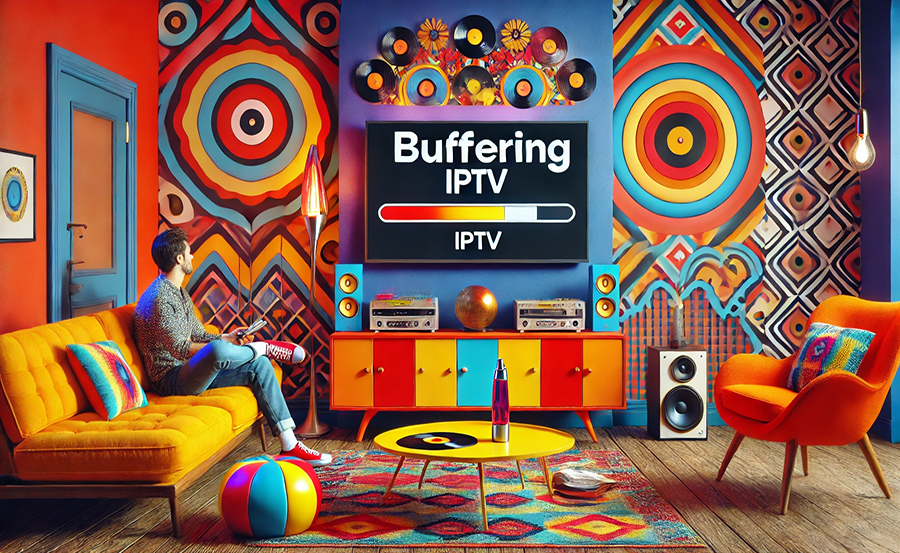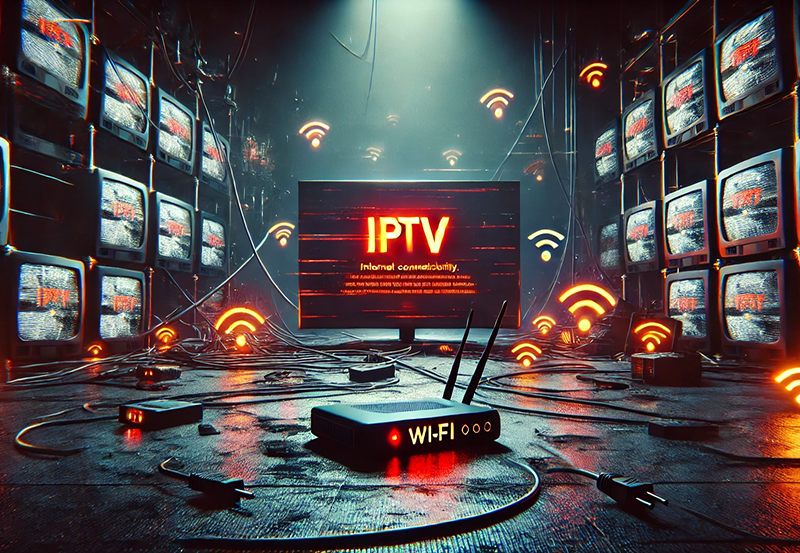In today’s fast-paced digital landscape, IPTV (Internet Protocol Television) has become a popular choice for streaming movies and television shows. However, users frequently encounter the frustration of buffering, which can severely disrupt viewing experiences. This article explores the technical causes behind IPTV buffering and provides practical solutions to enhance streaming quality. Whether you’re considering the top IPTV subscriptions or seeking the best IPTV for streaming movies, understanding these factors will empower you to amplify your IPTV enjoyment effortlessly.
What is IPTV Buffering?
Buffering is the unwelcome pause in video streaming that occurs when the video is stopped while data is being loaded. This phenomenon particularly stands out in IPTV streaming, where it is often caused by a myriad of technical factors. Recognizing what causes buffering can help you determine how to tackle these issues effectively, making your IPTV viewing seamless. wants Buy 1 Year IPTV Subscription
In its simplest terms, buffering transpires when internet connection speed fails to keep up with the streaming rate. The content pauses to collect sufficient data before proceeding, resulting in interruptions. While buffering is common across various streaming services, its impact is notably pronounced in IPTV due to the way data is transmitted over different networks.
The Impact of Internet Bandwidth on IPTV
A primary contributor to IPTV buffering is inadequate internet bandwidth. Bandwidth refers to the data transfer rate within your internet connection. If your bandwidth is insufficient, particularly during peak usage times, buffering is more likely to occur. Users with multiple devices connected often experience reduced bandwidth, further exacerbating the issue.
For optimal streaming, your bandwidth should comfortably exceed the requirements of your IPTV service. This ensures smooth data transmission and minimizes buffering interruptions. Network congestion can also impact bandwidth availability, slowing down the data flow and leading to potential buffering.
Solutions for Bandwidth-Related Buffering
- Upgrade your internet plan to higher bandwidth allocation.
- Disconnect unused devices from the network during streaming.
- Utilize wired connections instead of Wi-Fi for stable connections.
Server Capability and Its Role in Buffering
The servers hosting IPTV content play a significant role in determining the quality of your streaming. When these servers are overwhelmed with user requests, their output capabilities diminish, causing buffering. Server location also influences buffering; closer proximity usually translates to minimal delay.
Aside from user congestion, server configurations and software can impact performance. Well-maintained servers with optimal configurations ensure content is delivered efficiently. The integrity of the service provider thus becomes crucial for good IPTV experiences.
Mitigating Server-Related Buffering
Choosing reliable IPTV providers with a robust server infrastructure is key. Look for providers with a history of minimal buffering issues and sound technical support. Evaluate their server dispersion strategies, including load balancing, to understand how they manage large traffic volumes.
Establishing communication with customer support for any persistent server issues can provide tailored solutions. Providers may offer alternate server connections or upgrades for a more consistent streaming service.
Device Specifications Affecting IPTV Performance
The hardware you’re using to stream IPTV can also impact buffering. The processing capability, network adapter quality, and software updates of your device contribute to its ability to handle streaming effectively. Outdated or underpowered devices can lead to increased buffering incidents.
No matter how excellent your internet or service provider is, if your device struggles to process the data, buffering will occur. Ensuring your streaming device meets the recommended specifications for IPTV services can reduce occurrences of buffering.
Optimizing Device Specifications
Regularly updating your device’s firmware and applications ensures you have access to the latest performance enhancements. Consider devices specifically designed for streaming as they often deliver superior performance.
- Clear cache and unnecessary applications to free up device resources.
- Ensure your device supports high bandwidth and streaming requirements.
- Invest in high-quality streaming devices for a more reliable experience.
Network Configuration and Signal Strength
Network configurations, including router settings and signal strength, are pivotal in affecting IPTV performance. Improperly configured routers or weak signals can result in substantial buffering. Optimizing these elements can turn your IPTV buffering woes around.
Signal disruptions, caused by physical obstacles or distance from the router, can also contribute to buffering. By addressing these network concerns, you can markedly improve your streaming quality.
Improving Your Network Environment
Position your router strategically to enhance signal distribution across your space. Avoid placing it behind walls or furniture that could obstruct the signal. For extensive homes, consider mesh networks or signal boosters to accomplish even coverage.
Check your router’s settings to ensure it’s operating on a less congested channel. Using management tools provided by many modern routers can also give insights into optimizing network performance.
Impact of IPTV Settings on Buffering
Even the most proficient systems can falter if the IPTV settings themselves are not conducive to smooth streaming. Some settings, inadvertently set incorrectly, can directly lead to buffering havoc. It’s essential to capitalize on your system’s capabilities by refining these configurations.
Adjusting Settings for Optimal Performance
- Select the video quality settings according to your internet speed.
- Opt for lower resolution if experiencing consistent buffering.
- Ensure software and applications are set to auto-update.
Exploring External Factors Affecting IPTV
Beyond the more apparent components, external environmental and digital factors may also influence IPTV buffering. These include regional internet infrastructure reliability and even weather conditions, which can disrupt connectivity temporarily. Recognizing these factors’ impacts can help you manage expectations and responses.
Furthermore, malware and other digital threats can compromise network and device function, impacting IPTV performance. Vigilantly safeguarding your systems ensures uninterrupted service.
Taking a Proactive Approach
Stay informed about regional service disruptions that may affect ISP and IPTV service capabilities. Regularly running antivirus software can help protect your devices from threats that could impact streaming abilities. Consider VPNs if privacy and regional restrictions are of concern, though they may occasionally affect speed.
By adopting these precautions and insights, users can circumvent some of the unpredictable issues that arise with IPTV services.
Conclusion: Rediscover the Joy of Seamless Streaming
Buffering need not be an endless source of hassle when engaging with IPTV content. By understanding the technical intricacies and applying the solutions above, streaming interruptions can become a rarity. With top IPTV subscriptions that offer robust support, and fine-tuning your environment, you’re well on your way to a smoother viewing experience.
Take the leap by investing in the best IPTV for streaming movies with confidence, knowing your streaming infrastructure is reinforced against disruption. Enjoy your IPTV services to the fullest, amplifying your viewing pleasure effortlessly.
Frequently Asked Questions

What should I consider when choosing an IPTV provider?
Evaluate their server reliability, customer support, and the quality of their streaming service. Look for favorable reviews and service guarantees that cater to enhanced viewing experiences.
How do I know if my bandwidth is sufficient for IPTV?
You can conduct a speed test online to determine your current bandwidth. Compare this with the recommended requirements provided by your IPTV service for optimal streaming quality.
Can a VPN improve my IPTV experience?
While VPNs can increase privacy and circumvent regional blocks, they may sometimes reduce speeds. Choose a high-quality VPN optimized for streaming to minimize impact on performance.
Why does IPTV buffer more during certain times of the day?
Network congestion often occurs during peak hours when many users are online. Upgrading your internet plan or allocating your resources effectively can help mitigate the impact of peak-hour usage.
Is it worth investing in a high-quality streaming device?Yes, high-quality streaming devices typically have better processors, more consistent software updates, and often provide a more seamless streaming experience compared to standard devices.
The Ultimate IPTV Troubleshooting Guide: Fix Common Issues Fast





